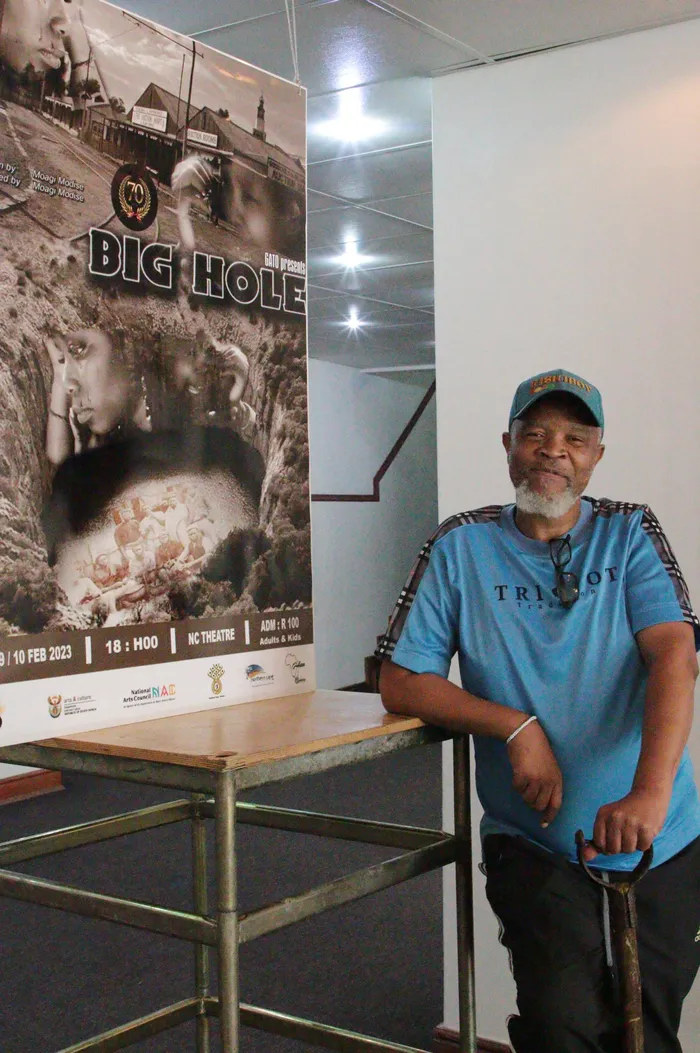Big Hole tragedy comes to life

Renowned South African actor Moagi Modise is the writer and producer of a theatre production titled ‘Big Hole’. Picture: Soraya Crowie
THE UNTOLD and heartbreaking story of a mining disaster that occurred at Kimberley’s Big Hole, where more than 200 miners died, will be portrayed on the stage of the Northern Cape Theatre on Thursday and Friday (February 9 and 10).
The production was written and is being directed by renowned Kimberley-born actor Moagi Modise.
Modise, who has starred in various productions in theatres across the country, on national television and even on the big screen, said he not only wanted to “give life” to the victims who died during the mining disaster in 1888, but also tell the stories of the loved ones of the deceased.
“This mining disaster is probably the first mining disaster to occur in South Africa but it was never recorded in any of the history books,” said Modise.
“Many people only know the Big Hole, or rather Kimberley’s naval, as I refer to it, as a tourist attraction. Many do not know or are even aware of the tragic incident where 202 miners, the majority being black, died. There is also no monument or record about who those men were.
“Growing up I heard stories from my grandmother about that fateful day. I again stumbled across this story when I was reading about the Phokwane Chronicles. I wondered who the deceased were and I tried to get some information on the incident at the Africana Library and McGregor Museum.
“To my shock, there was no recorded information nor was the incident captured in the South African history books. The men who died on that day are nameless and faceless . . . it is as if they never existed. That inspired me even more to tell the story.”
Modise added that, unlike many productions where the stories are relayed from the miners’ point of view, he wanted to tell the background story of the victims.
“There will be no mining activities portrayed on stage. In fact, the cast members are all female, who play the roles of loved ones of the deceased. The production tells the story of a group of women, who are from different backgrounds but were brought together in Kimberley when they were seeking clarity on the tragedy that killed their loved ones.
“Remember, back in those days the women were left at home to take care of the children while the men and fathers went to the mines to work. These women were left to raise children on their own.
“One can only imagine the fear and pain they each experienced on that day. We get to hear who these men are through the stories the women tell to each other as they wait for news on their husbands, brothers and sons who had died during that mining disaster.
“Also bearing in mind that although they had travelled far to get clarity on the tragedy and also had to transport the bodies of their loved ones back home, they were denied access to the hostels as these facilities did not allow women. So the group camped outside the hostel awaiting news and in doing so formed a bond during their tragedy and pain.
“The actors portray the stories of a mother, a wife, a sister and even a prostitute who used to entertain some of the men at the mine.
“The prostitute tells the story of the dreams and aspirations these men had when they were employed at the mines. The production will capture the story behind the story of the victims as well as those who were left behind.”
Modise said the production will also serve as a legacy piece for the miners.
“The women were left to raise children. I thought if I was the grandchild of one of those who died on that day, I would like to know what happened on that day. The Big Hole is a world-recognised site, but the story of how it came into existence is one-sided.”
Modise said portraying and telling the stories of the Northern Cape and its people is one of his main endeavours.
“The Northern Cape is rich in history and untold stories. We have the descendants of Khoi and San living in various parts of the Province. There are Nama tribes whose stories are not told or captured.
“We need to tell the stories of the Northern Cape as this Province is often overlooked. We need all stakeholders in the arts industry to invest in these initiatives as well as in the talent we have in the Province. We can not wait for international directors, writers and actors to first highlight and portray our history before we take any interest in our own stories,” Modise said.